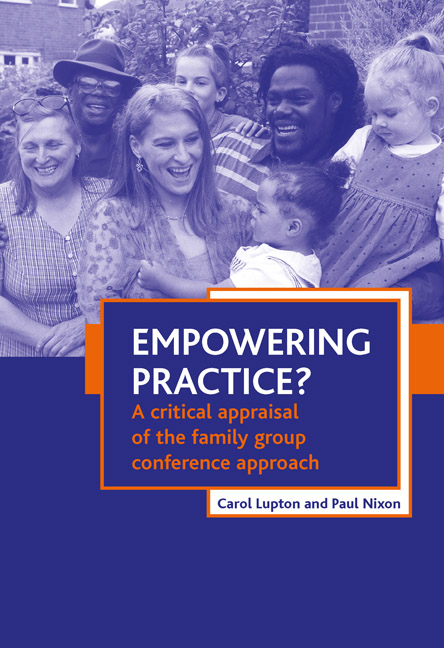Book contents
- Frontmatter
- Contents
- Preface
- Acknowledgements
- Introduction
- one The dilemmas of empowerment
- two Partnership and empowerment in children’s services
- three Lessons from New Zealand
- four Empowering professionals?
- five International perspectives
- six Empowerment in process?
- seven Assessing outcomes in child welfare
- eight Empowering outcomes?
- nine Conclusion
- Bibliography
- Index
seven - Assessing outcomes in child welfare
Published online by Cambridge University Press: 05 July 2022
- Frontmatter
- Contents
- Preface
- Acknowledgements
- Introduction
- one The dilemmas of empowerment
- two Partnership and empowerment in children’s services
- three Lessons from New Zealand
- four Empowering professionals?
- five International perspectives
- six Empowerment in process?
- seven Assessing outcomes in child welfare
- eight Empowering outcomes?
- nine Conclusion
- Bibliography
- Index
Summary
Introduction
As we have seen, there is now a growing body of research on the process and practice of FGCs. There is, however, much less robust evidence, as the next chapter will discuss, on the outcomes of the FGC approach. In part this is due to the relative immaturity of the development of the model in many national sites. In part, however, it is the result of the fact that the identification and measurement of outcomes is conceptually and methodologically difficult. Yet the focus on outcomes has been an increasingly important aspect of the debates surrounding social work/care generally, and child welfare and protection in particular, in the UK over the last two decades. This interest has been prompted by a range of factors, including concerns about the cost of services, a series of high profile child deaths and the growth of the consumer movement. As a result, Parker et al (1991) argue, the importance of outcome measures to researchers has become “self-evident” (1991, p 11).
Recent years have witnessed a move at central policy level to establish the ‘evidence base’ for social work practice with children and families. Thus, for example, in 1997 the Department of Health initiated (in collaboration with a consortium of local authorities in the South West region) the Centre for Evidence-Based Social Services (CEBSS) at the University of Exeter, whose remit is to promote the use of research-based evidence (MacDonald et al, 1992; Sheldon, 1994) in the development of social work practice. Local authorities across the country have also cooperated to fund ‘Research in Practice’, another initiative concerned to assess and disseminate more widely the results of child welfare research. Both these developments highlight the increased political importance placed on assessing and evaluating outcomes in child welfare and public social services generally, an enterprise supported by a growing number of academic/agency researchers (Parton, 1991; Parker et al, 1991; Thorpe, 1994; Farmer and Owen, 1995; Hill et al, 1996).
In this chapter we will start by examining the reasons for studying the impact or ‘outcome’ of social work interventions, and will consider some of the ways in which outcomes have been defined and evaluated in social care and child welfare.
- Type
- Chapter
- Information
- Empowering Practice?A Critical Appraisal of the Family Group Conference Approach, pp. 139 - 154Publisher: Bristol University PressPrint publication year: 1999



